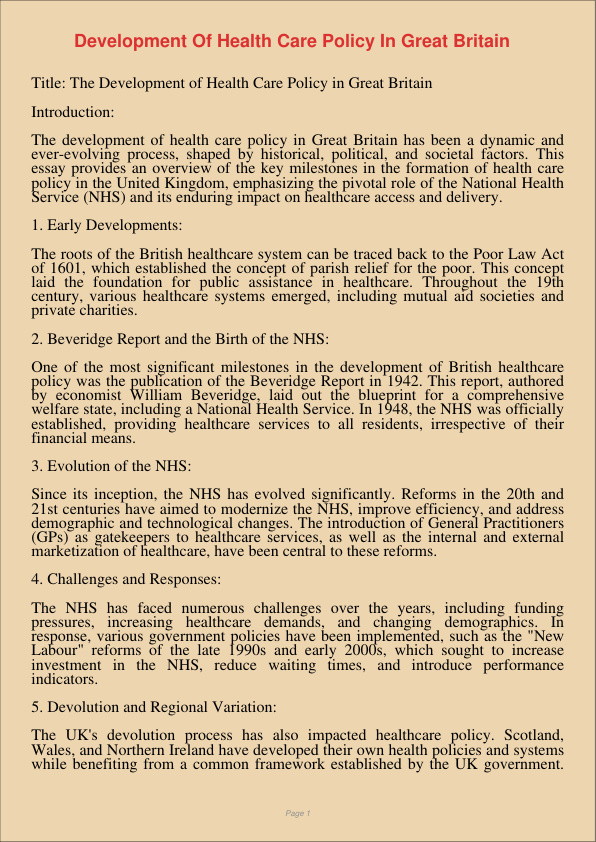Development Of Health Care Policy In Great Britain
Jan 7, 2024
health care policy
great britain
Visual Arts & Film Studies
Engineering and Construction
Title: The Development of Health Care Policy in Great Britain
Introduction:
The development of health care policy in Great Britain has been a dynamic and ever-evolving process, shaped by historical, political, and societal factors. This essay provides an overview of the key milestones in the formation of health care policy in the United Kingdom, emphasizing the pivotal role of the National Health Service (NHS) and its enduring impact on healthcare access and delivery.
- Early Developments:
The roots of the British healthcare system can be traced back to the Poor Law Act of 1601, which established the concept of parish relief for the poor. This concept laid the foundation for public assistance in healthcare. Throughout the 19th century, various healthcare systems emerged, including mutual aid societies and private charities.
- Beveridge Report and the Birth of the NHS:
One of the most significant milestones in the development of British healthcare policy was the publication of the Beveridge Report in 1942. This report, authored by economist William Beveridge, laid out the blueprint for a comprehensive welfare state, including a National Health Service. In 1948, the NHS was officially established, providing healthcare services to all residents, irrespective of their financial means.
- Evolution of the NHS:
Since its inception, the NHS has evolved significantly. Reforms in the 20th and 21st centuries have aimed to modernize the NHS, improve efficiency, and address demographic and technological changes. The introduction of General Practitioners (GPs) as gatekeepers to healthcare services, as well as the internal and external marketization of healthcare, have been central to these reforms.
- Challenges and Responses:
The NHS has faced numerous challenges over the years, including funding pressures, increasing healthcare demands, and changing demographics. In response, various government policies have been implemented, such as the “New Labour” reforms of the late 1990s and early 2000s, which sought to increase investment in the NHS, reduce waiting times, and introduce performance indicators.
- Devolution and Regional Variation:
The UK’s devolution process has also impacted healthcare policy. Scotland, Wales, and Northern Ireland have developed their own health policies and systems while benefiting from a common framework established by the UK government. This has allowed for flexibility and adaptation to regional healthcare needs.
- Recent Developments:
More recent healthcare policy developments in Great Britain include the integration of health and social care services to improve patient care and outcomes. The NHS Long Term Plan, launched in 2019, outlines a roadmap for addressing future healthcare challenges, including an emphasis on prevention, technology, and workforce development.
Conclusion:
The development of health care policy in Great Britain is characterized by a strong commitment to the principle of universal access to healthcare services. The creation of the NHS in 1948 marked a historic turning point in healthcare provision, and the subsequent reforms and adaptations have allowed the system to respond to changing needs and challenges. While healthcare policy in the UK continues to evolve, the enduring legacy of the NHS as a symbol of equitable and accessible healthcare remains a cornerstone of British society and an inspiration to healthcare systems worldwide.
